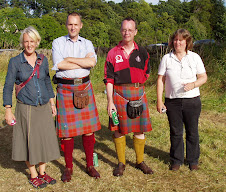Little to report, but all's well. The
Five-Day Weather Forecast on “Farming Today” this morning – a
Monday morning 6 a.m. feature which I usually sleep through – said
that after a week of “unsettled” weather, a “ridge of high
pressure” – always an outrider of good news – would appear at
the weekend. Just in time for the wedding.
Rachel phoned from Loch Fybe yesterday. She and Ed are safely there, after the long drive from London. Hellie and Matt, bride and bridegroom, will join them today.
I knit quite a bit yesterday. I'm about
1/3d of the way from the beginning to the underarm of my husband's
new sleeveless vest, knit circularly. The fabric has a bit of lustre
to it, really nice. I don't remember that that was true of Archie's
Composition Book Grey. And the first skein is nearly finished. All
this careful, fancy knitting of late hasn't produced much in the way
of finished skeins, so that feels good.
I struggle on with science. Thank you
for your careful message, Andrea (comment, Saturday). I think I
understand what you are saying, as far as it goes. And I suspect that
a lot of my trouble is an over-simplified (or just plain wrong)
mental image of DNA and genes and their arrangement into chromosomes,
in my own head.
How can the single cell from which we
are all sprung, ever have evolved into something so clever as sexual
reproduction when it would seem so much easier just to go on
dividing? That's one of my questions. I guess that's an aspect of
speciation, which is my main area of concern.
Glad to be rid of Dawkins, I have
started reading “The Epigenetics Revolution” by Nessa Carey. It
starts well. Its concerns are sort of peripheral to my main
questions, but sometimes it helps to come at a problem sideways. It
is very lucid, and it is very pleasant, after Dawkins, not to be
harangued but to have an author who, instead, carefully explains
things to me.
She has promised to tell me why
tortoiseshell cats are always female, so it's worth reading on. (In
fact, a male one has recently astonished science by turning up at a
cat shelter in Edinburgh.)
As for the local cat, feliculture
continues well, too. I have only needed to use the sprayer once more,
when I was trying to tie my shoelaces this morning and Perdita was
shooting out from under the bed all teeth and claws. It turns out
that she not only understands “No!”, she also knows perfectly
well what sort of behaviour it is I don't like. But sometimes
temptation overwhelms her.
When my husband comes home, I fear she
will have to be shut in the kitchen at night. Deprived of the
opportunity to tear me apart, she wanders around the bedroom looking
for things to knock to the floor. She is rather inventive. Then she
comes and snuggles up with me and we go to sleep.
I have an INR blood test scheduled for
this morning, after rather a long interval. The result will be
interesting.



I have been away for a few days, and must go back see if I can understand any of Andrea's comment. Some plain stocking stitch in lovely yarn is just the ticket sometimes. Did you watch the tennis?
ReplyDeletePerdita is such a joy. I'm eager for more photos of her.
ReplyDeleteBecause sex between bacteria's a good way to pass around genes that help 'em survive. Take a single cell of bacteria in a gut somewhere that's lucked into a gene that offers some antibiotic resistance. The owner of the gut goes through some illness requiring antibiotics, and suddenly this little bacterium is the only one left. It starts dividing like mad, and as new bacteria enter the gut (from probiotics or food or whatever) they meet up with it and go "ooh, look at that lovely gene, I'll have some of that!" and either they switch genes or one copies the other, I dunno. Thus the owner of the gut ends up with one full of antibiotic-resistant bacteria (bad), but hopefully they're nice friendly gut flora and not nasty infectious-disease causing ones.
ReplyDeleteThis is why you finish rounds of antibiotics. Your body doesn't get resistant to the medicine, the bacteria in your body do. If you don't finish the round of drugs (and thereby hopefully finish poisoning them) you just end up with the strongest and most resilient surviving to repopulate.
Sorry, what was the question? I've had to give that lecture several times recently (in person it's a bit more of a rant because widespread antibiotic resistance is scary as crap to me).
Ah, yes, how it got started? Well, cells mess with genes pretty constantly, if I remember correctly. DNA gets pulled apart so it can be copied by RNA (I remember there being 3 kinds, though what each of them does is a mystery to me) which then wanders off and is somehow a blueprint for proteins.
I've always wondered how mitochondria ended up in the picture (mitochondria are sorta the engine of a animal cell (for plant cells chloroplasts serve the same function) but they have their own DNA and very probably used to be separate cells of their own.)
Hopefully this was vaguely helpful, and not just me rambling. (If it's the later, I haven't slept properly in over a week and I haven't had caffeine yet this morning (and google wants to correct that to coffee. Damn google, tempting me with things I cannot have if I'd like my digestive system to not operate in reverse).
This may be tough reading, but here's a really thorough article about the origins of sex by one of my favorite science writers, Carl Zimmer:
ReplyDeletehttp://carlzimmer.com/articles/2009.php?subaction=showfull&id=1248903423&archive=&start_from=&ucat=12&
I recommend his blog "The Loom" and any book he has ever written!
Judith in Ottawa
I loved those early morning Radio 4 programmes. I would usually doze off again as those familiar programmes carried on. e.g. the Shipping Forecast. I miss them.
ReplyDeleteBbc radio is available world wide via web and on any iphone, ipad device - there is an app called BBC iPLAYER that you can download and install and get all radio stations (except live sports) also via their website.
Deletealso available on Grace Digital Internet radios.
my second cat was a male (kind of ) tortoise - very sweet, but not able to produce offspring (because of his extra x-chromosome with red on one x-chromosome, and the black on the other).
ReplyDeleteif we only did asexual reproduction all the organisms of a species would be the same and hence vulnerable. if there is variation there are more chances of survival.
perhaps it helps to realize that the sequence of the 4 different bases which make up the DNA molecules form a code for making proteins. these bases are organized in regions called genes, and the whole thingeamading is a chromosome. if there is a mutation in one particular spot of the DNA, for instance not cytosine but adenine, then the whole machinery does not work. (well kind of, it depends of course).
wikipedia might help too.
and a book i found interesting was 'The beak of the finch' on the research on the Darwin finches of the Galapagos Islands.
i came for the knitting to begin with, but ruminations such as these on subjects like evolution, are what makes this blog special. I'm no evolutionary biologist, but it might help to remember that different species develop when the same original gene pool finds itself in different environments - which each favour a slight difference after slight difference, over VERY long stretches of time. These diverging populations eventually end up far enough apart that they can no longer interbreed. Sexual reproduction leads to mixing of genes which helps put new combinations together, and so helps with evolution. How reproducing that way instead of simply dividing time after time, came to be the method of choice for most organisms is, I think, still not something we have a good explanation for - if I remember a recent Infinite Monkey Cage correctly.
ReplyDeleteYou might find John Maynard Smith's "the theory of evolution" helpful - it's getting a bit old now, but many of the principles haven't changed. If you can't find it online, you would be welcome to borrow my copy.
Even amoebas occasionally join instead of just dividing. If you're in a hurry, there are some Wikipedia articles on the subject.
ReplyDeleteIf you really want to be confused, read about "jumping genes." Then read about how fetal cells cross the placental barrier and can set up anywhere in the mother's body.
well, i am not a biologist and so dont have anything to offer... however re Perdita's pre sleep behaviour... there are a few toys that are not expensive - a laser and a stick with a mouse or bird on the end which she may enjoy playing with you ... and which we not require any movement from your bed.
ReplyDeleteit would be a nice evening ritual for you both.. and perhaps you could have a set in your sitting room so that she can be distracted from the knitting... oh but the chest of attractive objets... i forgot about that.
oh well, i guess it would be too much to move them until she is older?
anyway, i echo the other poster re more photos!
Fingers crossed on the weather front. today for Rosh Hashana a glorious Canadian front has moved in ... the low last night was in the 50s - oh please come soon fall.
Roger lost. there was much crying and screaming in my wee apt. he had worked so hard and is playing so well. i am still devastated that he lost - never a Djokovic fan, still not.
Flavia Penneta was the star of the 2015 tourney... what a wonderful match that was - two old and dear friends playing their hearts out with no rancor or angst... such a difference to the mens final. (i really wish we didnt have such hype about 'rivalries" oh well the press must have something about which to write.
l'shana tovah to those who celebrate!